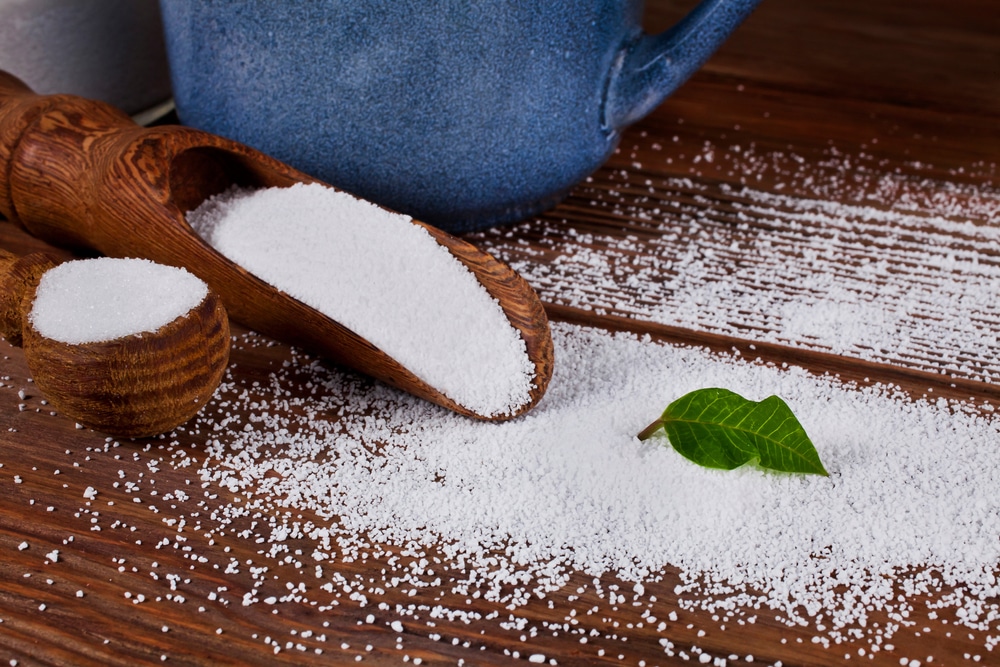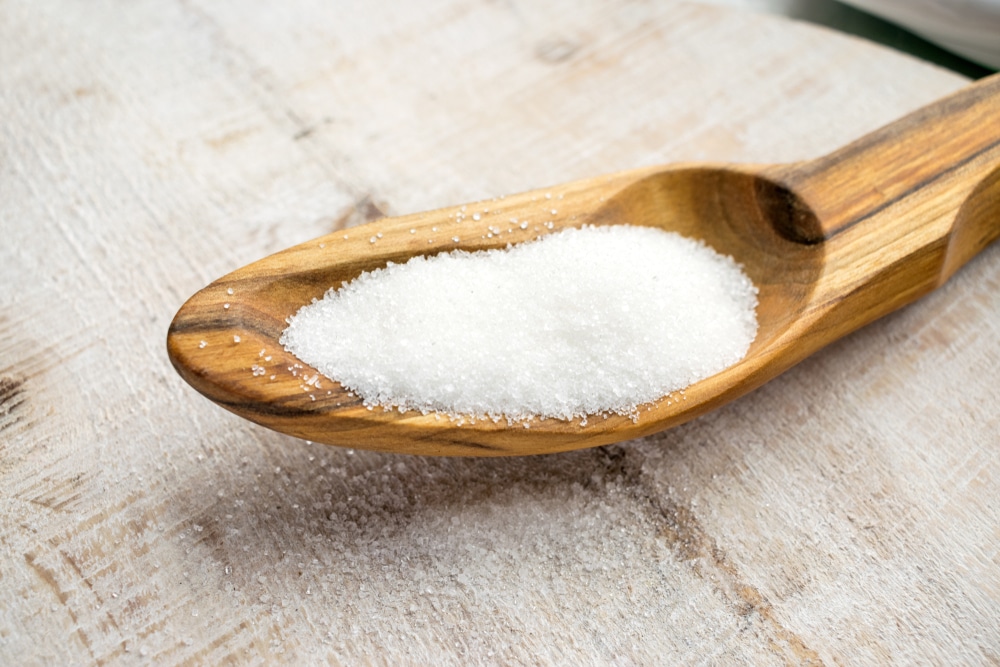Do you know what sorbitol is? It’s a sweet sugar-driven alcohol naturally found in fruits like pears, peaches, bananas, plums, and apples. Sorbitol is safe for people to consume in small doses. But is sorbitol safe for dogs too?
Sorbitol is safe for dogs when it’s in a smaller dose. Due to its low glycemic index, sorbitol is non-hazardous for dogs. Therefore, it poses no risk of spiking your dog’s blood sugar or feeding the harmful bacteria in its digestive tract. Never give your dog a diet heavy in processed sugar though.
Table of Contents
What Has Sorbitol In It?

A variety of fruits, such as apples, cherries, figs, strawberries, apricots, plums, and dates will have sorbitol. Manufacturers also produce sorbitol commercially from corn syrup. They use sorbitol in processed foods, drinks, and pharmaceuticals.
Is Sorbitol Safe For Dogs?
It is generally accepted that sorbitol does not pose any health risks to dogs. However, it’s not necessary to include sugar or sugar alternatives in goods for pets. Sugar is not something dogs naturally crave, yet they can develop an addiction to it just like humans do.
Sorbitol may encourage them to consume excessively and turn their nose up at less sweet but healthier meal selections. It is better to stay away from sweeteners whenever it is at all possible so as not to go down this dangerous path.
Also, high sugar consumption can cause tooth decay and weight gain.
Why Is Sorbitol Safe For Dogs?
Sorbitol is a sugar alcohol, which means it does not break down in your dog’s body to increase glucose levels. It also means it does not feed dangerous bacteria already present in your dog’s digestive tract. Dogs eliminate sorbitol through urination in a nearly unprocessed state. So, it does very little to no damage to your dog’s digestive system.
What Is The Glycemic Index Of Sorbitol?
Sorbitol has a glycemic index of 5, which is relatively low. The glycaemic index, sometimes known as the GI, is a grading system applied to foods that include carbs. It demonstrates how rapidly individual foods influence your blood sugar (glucose) level when consumed independently.
How Dogs Could Ingest Sorbitol
Berries such as blueberries and strawberries, as well as other fruits such as bananas, apricots, avocados, apples, grapes, and plums, all contain a naturally occurring form of sorbitol. Therefore, if you give your pet any of these fruits, you will give them sorbitol indirectly (however, we recommend double-checking it’s safe to give your dog those fruits before doing so). In addition, sorbitol shows up in commercial dog meals and dog toothpaste as a means of enhancing the sweetness or flavor of the product.
Is Sorbitol Safe For Dogs In Dogs’ Toothpaste?
When it comes to toothpaste, sorbitol is entirely risk-free for canine consumption. However, consuming sorbitol from outside sources, such as dog food or treats, might pose a health concern.
It is perfectly okay to use toothpaste that contains sorbitol to brush your dog’s teeth. Make sure you wash your dog’s teeth twice a day to prevent the formation of plaque and tartar.
Is It Safe For Dog Treats To Have Sorbitol In Them?
In most cases, manufacturers produce sorbitol synthetically in dog treats. It serves both as a flavoring ingredient and a sugar alternative. It’s fine to give them to your dog in moderation, but the problem with sorbitol dog treats is they can become addictive.
Therefore, a dog who is dependent on sorbitol or a dog that consumes a greater quantity of it may have issues with hunger, obesity, anxiety, cataracts, dental decay, arthritis, or allergic reactions.
What Are The Side Effects Of A Sorbitol Overdose?
Large doses of sorbitol can cause highly unpleasant side effects in both people and dogs. This is true even when the dose is reduced. Therefore, in addition to the odd piece of fruit or a sweet treat (for example, one little treat every other day), you shouldn’t allow your dog to feed on sweets or other delights containing sorbitol.
Obviously, how much your dog’s body can process at a given time will determine this. And how would you know if your specific dog has consumed an unsafe amount of sorbitol? The following are some of the telltale indicators of an overdose of sorbitol in dogs.
Diarrhea
When a food contains a significant quantity of sorbitol, it has the propensity to generate an excessive amount of water absorption. The feces produced as a consequence of this condition in a dog’s intestines becomes liquid and cannot form a more solid mass by clumping together.
It is also common for sorbitol to irritate a dog’s intestines. This speeds up the pace at which bowel movements occur. It also causes the dog to eliminate more often than usual (diarrhea). The dog can become dehydrated if it eliminates too frequently.
Sorbitol plays a role in this process because it possesses both osmotic and laxative characteristics. Sorbitol is also employed occasionally in treating cases of chemical poisoning and constipation in canine patients, although this should only be left to a veterinarian to decide.
Stomach Upset
In addition to diarrhea, the dog may also have gastrointestinal discomfort and bloating in its stomach. The microbiome of its digestive tract, which is made up of healthy bacteria and other organisms that live in its stomach and intestines, is disrupted as a result, and it experiences an increase in gas production. This results in the formation of flatulence. It’s also possible your dog will experience nausea and vomiting.
Take note that administering sorbitol to your dog, which already suffers from irritable bowel syndrome (IBS), will only make the condition even more severe. We again recommend leaving the administering of sorbitol to a veterinarian’s discretion.
Pregnant And Nursing Dogs
Sorbitol entered into the milk of nursing rats in past studies, and as a consequence, the rats’ offspring displayed indicators of toxicity.
Specifically, the offspring exposed to sorbitol had bone and liver damage symptoms, and they were also much smaller than average.
Even though these effects haven’t been studied in pups who have been nursed, it’s still essential to ensure you don’t give sorbitol to a pregnant canine.
Final Thoughts: Is Sorbitol Safe For Dogs?
If you are seeking an alternative to refined sugar for your dog, sorbitol is a safe option because it is entirely okay for canines to consume. However, similar to other sweeteners on the market, sorbitol might cause a few unpleasant side effects, mainly if you give your dog a substantial amount of the substance to ingest.
Therefore, if you want the most out of this sweetener, using it in moderation is the most important thing you can do.
So, what’s got you interested in dogs and sorbitol? Let us know your thoughts and why in the comments below!
